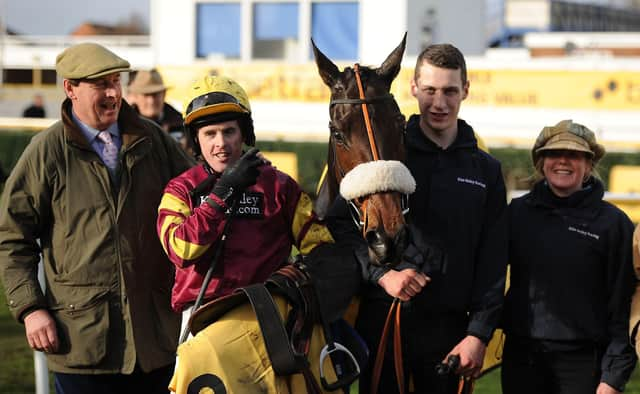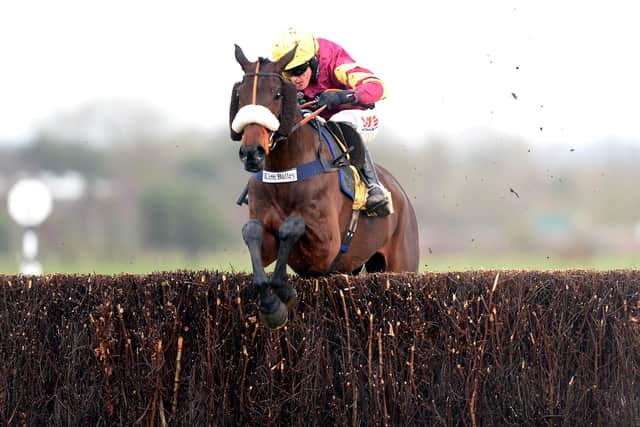Kim Bailey in racehorse welfare plea to trainers and owners after BBC Panorama expose


Bailey, who has trained the winners of the Grand National, Gold Cup and Champion Hurdle in a career stretching over more than 30 years, described the covert footage of abattoirs broadcast by the BBC’s Panorama programme as “horrific” and “horrendous”.
He stressed too, however, that it is incumbent on those who own and look after horses in their racing years to do all they can to help provide a safe and comfortable home for them afterwards.
Advertisement
Hide AdAdvertisement
Hide AdThe documentary broadcast scenes of horses about to be euthanised at an abattoir in Swindon, reporting many had arrived there after gruelling and inhumane transportation from Ireland


The British Horseracing Authority has responded by calling urgent meetings to discuss the troubling issues with industry leaders, including the independently-chaired Horse Welfare Board, and their counterparts at Horse Racing Ireland.
Bailey said: “You can keep re-funding and adding more funds as long as you want to - but the end product is it is up to the trainers, I believe, to make sure the horses they have in their own care find a home afterwards whereby they can be looked after and treasured for the rest of their lives.
“I think it’s something trainers need to point out to owners that, when they get involved in racing, they are as responsible as we are to make sure those horses – when they leave racing – have a future.
Advertisement
Hide AdAdvertisement
Hide Ad“You just can’t get involved in a horse and say ‘well, actually it’s stopped racing now – I want to get rid of it’. They’ve got to hold on to responsibility themselves. It’s a dual responsibility, from the trainers’ point of view and the owners’ to make sure we look after where horses go after racing.”
Also crucial, Bailey believes, is the administrative infrastructure which allows the movement of ex-racehorses to be properly tracked. “I think it’s incredibly important,” he said.
“We pass on horses on a regular basis – I think we’ve moved on about 20 this summer. We interview the people who are taking the horse on, (and) we get references from the people who are having them.
“They have to keep in touch with me during the entire time they have the horse. If at any stage during that period they find they can’t cope, for financial reasons or they find the horse is not suitable for them, the horse has to come back here - and then we can try again.”
Advertisement
Hide AdAdvertisement
Hide AdOne such horse was Bailey’s Harry Topper, a former winner of Wetherby’s Charlie Hall Chase.
He said: “Harry Topper - who was a very good horse for me some years ago - we rehomed him three times.
“The third time, we found the ideal home for him in Ireland with a person who used to look after him when she was here.
“They go from here with a view that, if it doesn’t work out, they have to come back - so they can’t disappear.”
Advertisement
Hide AdAdvertisement
Hide AdBailey was especially concerned by Panorama’s reports that many horses - including former top chaser Vyta Du Roc - had to endure transportation from Ireland to the abattoir in Swindon.
“I thought that was probably the most horrific part of the whole programme,” he said.
“I’m sure Ireland have their own abattoirs - (so) I cannot understand why horses had to be dragged from Ireland to Swindon. It made absolutely no sense to me whatsoever.
“I think that’s one area we need to really push to find out why that happens because (the horse) should never have been in the situation it was, to go from one country to the next.”
Advertisement
Hide AdAdvertisement
Hide AdMeanwhile Charlie Appleby’s stable stars Adayar and Hurricane Lane headline 31 entries for the world’s oldest Classic, the Group One Cazoo St Leger, at Doncaster on September 11.
First run in 1776, the extended 14-furlong contest is the highlight of the four-day Cazoo St Leger Festival and has a total prize fund of £700,000.
Adayar reppears in the King George VI & Queen Elizabeth Qipco Stakes at Ascot this weekend following his runaway win in last month’s Epsom Derby in which Hurricane Lane was third.
However Hurricane Lane has since gone on to win the Irish Derby and then prestigious Grand Prix de Paris just last week.
Having landed the spoils last year with the Tom Marquand-inspired Galileo Chrome, Joseph O’Brien could bid for a repeat success with Okita Soushi.